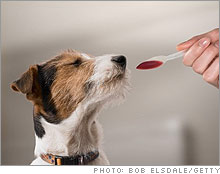|
PetMed Express: Catnip for your portfolio The retailer behind the 1-800-PetMeds ads is growing fast and its stock is a bargain.
(Fortune) -- In a world where pets are treated to designer duds, gourmet meals, luxury hotel rooms, and high-end cab services, people's devotion to animals has unleashed a giant opportunity for PetMed Express (Charts). The Pompano Beach, Fla.-based retailer - which sells pet medications, gifts and other products by phone, online and snail mail - has gone from being a penny stock in 2000 to a fast-growth company whose shares trade in the double digits. And we think this puppy has more room to grow.
Americans are expected to spend about $38.4 billion this year on their pets, up 35 percent from 2001, according to the American Pet Products Manufacturers Association. PetMed dominates a lucrative specialty - prescription animal drugs sold outside the traditional veterinarian's office channel. Because these medications are tightly controlled, they're not available in brick-and-mortar stores. And buyers increasingly are taking the mail-order approach: Five years ago, less than 1 percent of owners whose pets take medication bought it outside a vet's office, according to the company. Now up to 9 percent do, and even better, PetMed says it has more than half of that market. PetMed has used prescription medication as a way to break into the competitive, fragmented pet-supply market - creating a convenient, aggressively priced, one-stop shop for pet owners. Owners who want, say, a doggy bed no longer have to trek to big retailers like Wal-Mart (Charts), Costco (Charts) or Target (Charts), and then to a small local pet shop to buy Kitty's vitamins. Customers seem to like the convenience. The company posted annual sales of $137.6 million for the fiscal year ending March 2006, up 27% from the previous year. And quarterly sales continue to show double-digit growth. No wonder, then, that many high-growth, small-cap and emerging companies mutual funds, including those offered by Vanguard, Allianz CCM and American Century, have PetMed in their portfolios. But shares now are trading at around $11, close to their 52-week low, and almost half their 52-week high of $20.20. Why? Wall Street is worried mostly about rising advertising costs and disappointing new-customer numbers. With PetMed set to report quarterly earnings Monday, will its stock find a way out of the doghouse? Pet peeves PetMed began its retreat from $20 this April, and analysts say the sag was due in large part to concerns that election-year TV spots are making their signature 1-800-PetMeds ads very expensive. Avondale Partners lowered its rating on the stock to "market perform" from "market outperform" at the end of March and JMP Securities downgraded the company to "market outperform" from "strong buy" early this September. Both companies cited advertising costs. While the company understands investors' worries about ad costs, TV spots are the company's "bread and butter" when it comes to attracting new customers, said PetMed CFO Bruce S. Rosenbloom. Meanwhile, existing customers are proving as loyal as man's best friend, with return business soaring 30 percent in the last quarter, beating expectations. "More of our marketing activities are being directed at our existing base through e-mails and mailings," said Rosenbloom, which could help keep costs down at a time when TV ads are expensive. And if need be, the company would consider raising prices, company executives told investors at a conference hosted by Wedbush Morgan Securities in September. Meanwhile, some investors and analysts worry that PetMed could face inventory shortfalls because it cannot source its drugs directly from manufacturers like a veterinarian can. Due to competitive reasons, the company will not disclose who exactly they buy from, but this network includes other wholesalers and distributors and some smaller, secondary manufacturers. However, Rosenbloom says that with 100 to 150 active supply sources the company is unlikely to run out of products. Some investors may also be nervous about a pending lawsuit. Co-founder Yali Golan is suing former president and chairman and fellow co-founder Marc Puleo in a pay dispute. The original suit, which seeks unspecified damages, included only the two men when it was filed in 2003, but PetMed was added as a defendant in 2006. Neither of the men are still with the company. Michael Friedman, an analyst with Noble Financial Group, says the suit doesn't relate to company performance and Wall Street seems unfazed by the litigation. Warm and fuzzy outlook Despite some potential shakiness in the near term, we think PetMed is a smart company and a long-term buy. As more animal lovers discover the company, its market is likely to increase. PetMed stock trades at a reasonable P/E of 15.5 (compared with an average 29 for other drug delivery stocks) and the company has become the biggest name in the pet medication space. When earnings are released Monday, the stock may sink if the company's ad or sales numbers don't meet analysts' lowered expectations. So we recommend waiting to see how the stock reacts to earnings; it could become an even better bargain buy. Give it some time, and the stock may just become the pet of your portfolio. The analysts interviewed for this story do not own stock in the companies mentioned here. Hedge fund status symbol: $600,000 aquarium 5 Tips: How to keep your pet healthy without breaking the bank |
Sponsors
|

